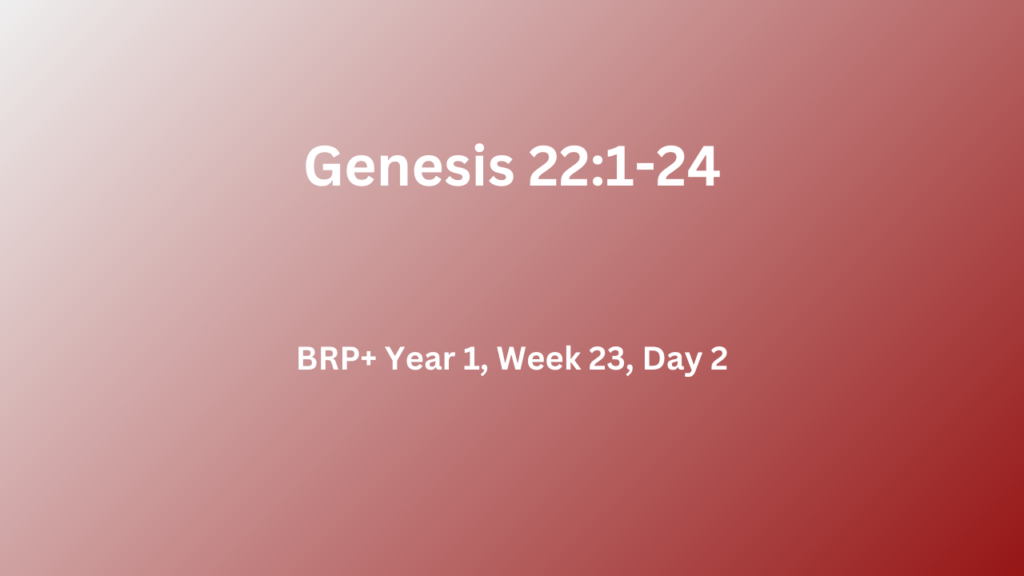Genesis 22:1-24
Q.1. How did God test Abraham’s faith in Him? What is the significance of what he was asked to do? How did Abraham respond to God’s provision? – (Gen.22:1-14 c.f. Jer.19:5; Heb.11:17-19; 1 Pet.1:6-7)
God had repeatedly tested Abraham’s faith in His promises. After many long years, a son was born to him and Sarah. We may believe that that should have been the end of the trials of his faith (Jms.1:2-4). However, the life of faith is never easy, and our faith will at times be refined by troubles and difficulties (see 1 Pet.1:6-7). The Lord then sent Abraham his greatest test – “Take now your son, your only son, whom you love, Isaac, and go to the land of Moriah, and offer him there as a burnt offering on one of the mountains of which I will tell you.” (Gen.22:2). Isaac was a teen at that time. Abraham took his servants and Isaac, then headed many days journey to the place of sacrifice (see Gen.22:3-8). The significance of this journey became evident when Isaac questioned what was about to happen (see Gen.22:6-8). Abraham built an altar to God on Mount Moriah, then bound his only son. Taking God at His word, he – … stretched out his hand and took the knife to slay his son (Gen.22:10). God later declared through Jeremiah, that human sacrifice was unacceptable to Him except the sacrifice of His One and Only Son. However, it is clear here that Abraham would have gone through with God’s command, for it is later explained – 17 By faith Abraham, when he was tested, offered up Isaac, and he who had received the promises was offering up his only begotten son; 18 it was he to whom it was said, “In Isaac your descendants shall be called.” 19 He considered that God is able to raise people even from the dead, from which he also received him back as a type (Heb.11:17-19 c.f. Jer.19:5). God stopped Abraham short and – He said, “Do not stretch out your hand against the lad and do nothing to him; for now I know that you fear God, since you have not withheld your son, your only son, from Me.” (Gen.22:12). God then provided a ram as a substitute sacrifice – in the place of his son (Gen.22:13). Abraham added another insight into his understanding of God, as a result of this test of his faith – Abraham called the name of that place ‘The Lord Will Provide’, as it is said to this day, “In the mount of the Lord it will be provided” (Gen.22:14). One day Adonai Yireh would provide the final sacrifice on the mountain of the Lord, in the person of His One and Only Son. This place where Jesus atoned for sinners was Mount Moriah (see 2 Chron.3:1).
Q.2. How did God strengthen His promises to Abraham? How far-reaching are these promises? What makes the genealogy of Nahor interesting? – (Gen.22:15-24 c.f. Gen.24:15, 24, 67; Heb.6:13-20)
It was unnecessary for God to confirm His promises with an oath, since it is impossible for Him to tell a lie (see Num.23:19; Heb.6:18). Why, then, was the oath added? Because God is a God of grace, He stooped down to our level – 13 For when God made the promise to Abraham, since He could swear by no one greater, He swore by Himself, 14 saying, “I will surely bless you and I will surely multiply you.” 15 And so, having patiently waited, he obtained the promise. 16 For men swear by one greater than themselves, and with them an oath given as confirmation is an end of every dispute. 17 In the same way God, desiring even more to show to the heirs of the promise the unchangeableness of His purpose, interposed with an oath, 18 so that by two unchangeable things in which it is impossible for God to lie, we who have taken refuge would have strong encouragement to take hold of the hope set before us (Heb.6:13-18 c.f. Gen.22:16-18). God would bless Abraham, his children, and their children. Through Abraham’s obedience, the promises of God were confirmed. Abraham’s confidence in God’s promises was strengthened when God said under oath – In your seed all the nations of the earth shall be blessed, because you have obeyed My voice” (Gen.22:18). Abraham’s brother Nahor stayed on at Ur of the Chaldeans (see Gen.11:26-31). His family grew, and his last-born son, Bethuel gave birth to Rebekah, who would become Isaac’s wife and the mother of Jacob (see Gen.22:23; 24:15, 24, 67).

